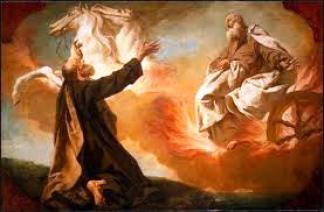A view of other unseen Worlds
I Cor 15 (v. 40) There are also celestial bodies and terrestrial bodies; but the glory of the celestial is one, and the glory of the terrestrial is another. (v. 41) There is one glory of the sun, another glory of the moon, and another glory of the stars; for one star differs from another star in glory.
Webster’s Dictionary defines these key words as:
Celestial—of or relating to the sky or visible heavens.
Terrestrial—belonging to the class of planets that are like the earth (as in density and silicate composition), the terrestrial planets: Mercury, Venus, and Mars.
Stars—a natural luminous gaseous celestial body of great mass, visible in the sky especial at night; a planet or a configuration of planets.
Heb 11 (v. 3) By faith we understand that the worlds were framed by the word of God....
While we rejoice that there are worlds which have never fallen, these worlds render praise and honor and glory to Jesus Christ for the plan of redemption to save the fallen sons of Adam, as well as to confirm themselves in their position and character of purity. The arm that raised the human family from the ruin which Satan has brought upon the race through his temptations, is the arm which has preserved the inhabitants of other worlds from sin.[1]
Every world throughout immensity engages the care and support of the Father and the Son; and this care is constantly exercised for fallen humanity. Christ is mediating in behalf of man, and the order of unseen worlds also is preserved by His mediatorial work. Are not these themes of sufficient magnitude and importance to engage our thoughts, and call forth our gratitude and adoration to God?[1]
So, there are other unseen worlds that Christ takes care of!!
Heb 1 (v. 2)....spoken to us by His Son, whom He has appointed heir of all things, through whom also He made the worlds;
The Lord has given me a view of other worlds. Wings were given me, and an angel attended me from the city to a place that was bright and glorious. The grass of the place was living green, and the birds there warbled a sweet song. The inhabitants of the place were of all sizes; they were noble, majestic, and lovely. They bore the express image of Jesus, and their countenances beamed with holy joy, expressive of the freedom and happiness of the place.[2]
Let us also consider what happened to Enoch?
Gen 5 (v. 23) So all the days of Enoch were three hundred and sixty-five years. (v. 24) And Enoch walked with God; and he was not, for God took him.
Heb 11 (v. 5) ....Enoch was translated so that he did not see death, and was not found....for before his translation he had this testimony, that he pleased God.
Then I was taken to a world which had seven moons. There I saw good old Enoch, who had been translated. On his right arm he bore a glorious palm, and on each leaf was written "Victory." Around his head was a dazzling white wreath….Above the wreath was a lovely crown that shone brighter than the sun. I asked him if this was the place he was taken to from the earth. He said, "It is not; the city is my home, and I have come to visit this place." He moved about the place as if perfectly at home.[3]
Rev 21 (v. 2) Then I John, saw the holy city, New Jerusalem, coming down out of heaven from God....
I begged of my attending angel to let me remain in that place. I could not bear the thought of coming back to this dark world again. Then the angel said, "You must go back, and if you are faithful, you, with the 144,000, shall have the privilege of visiting all the worlds and viewing the handiwork of God."[3]
If you are faithful, you will have the privilege of visiting all of the worlds which God has created.
Rev 14 (v. 1) Then I looked, and behold a Lamb standing on Mount Zion, and with Him one hundred and forty-four thousand,... (v. 4) ....These are the ones who follow the Lamb wherever He goes.
References:
1. Messages to Young People, p.254, par.1
2. Early Writings, p.39, par.3
3. Early Writings, p.40, par.1



